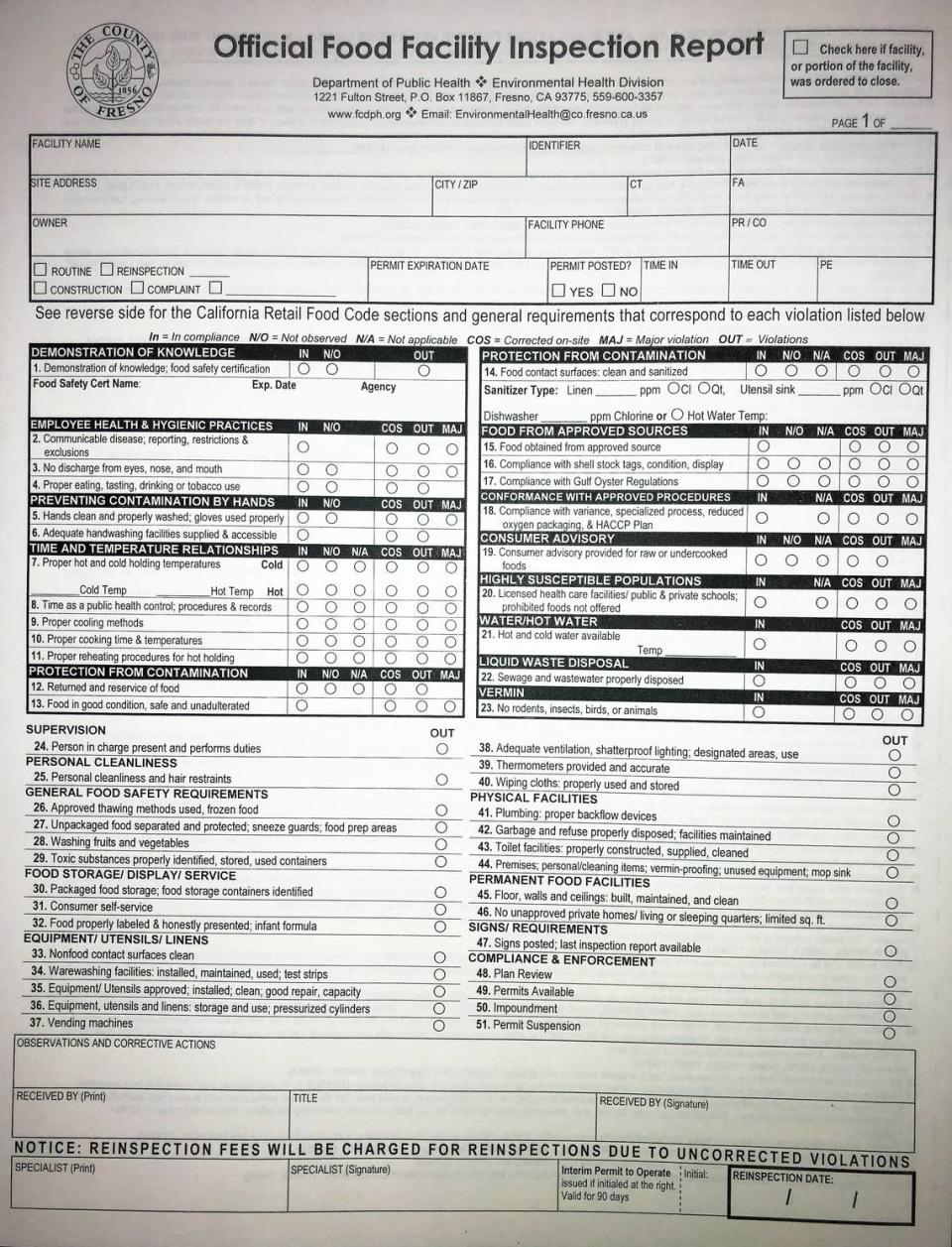Fire, water woes temporarily close Fresno-area food places in June. Here’s where
Fire damage forced the temporary closure of two Fresno-area food businesses by Fresno County health inspectors in June, while water and refrigeration problems were behind a third closure.
The closures were at the Indian Market in west-central Fresno; Tacos California operating out of a commissary in southeast Fresno; and the Burger King fast-food restaurant on Herndon Avenue in Clovis.
A June 1 fire at the commissary of the Indian Market at Clinton and Marks avenues prompted a call to the county’s Environmental Health Division for an inspection after the fire-suppression system in the kitchen went off to extinguish a blaze that started when a pan of oil overheated on a stovetop.
The chemicals from the fire-suppression system contaminated the kitchen floor, cooking equipment and food-preparation surfaces, prompting the temporary closure of the commissary until cleanup could be completed. A June 5 reinspection resulted in authorization for the business to reopen.
At the Tacos California commissary at Butler and Orange avenues, a June 4 inspection determined that the business lacked hot water as required for food kitchens, and refrigeration units were not able to keep cold food at an appropriate safe temperature. Tacos California was able to resume using the commissary following a reinspection visit July 3.
Fire was also the problem that closed the Burger King restaurant at Herndon and Clovis avenues in Clovis. Firefighters called health inspectors to the restaurant after the June 9 grease fire above the broiler in the kitchen.
Firefighters cut through the roof and ceiling of the restaurant, creating a hole in the ceiling above the broiler, and water and electrical service were also shut off. The resulting health inspection noted water and fire-extinguishing chemicals throughout the kitchen, including on food-related equipment.
Unopened food materials from the restaurant’s walk-in refrigerator and freezer were allowed to be taken to other Burger King restaurants.
The restaurant remained closed until June 13, after repairs were made to the building and utilities restored.
What inspectors look for
A lack of hot water is one of the most common violations inspectors from the Department of Public Health find when they make their routine visits. Hot water at a temperature of at least 120 degrees is considered important by inspectors for safely washing pots, pans, dishes and glasses, and 100 degrees for employees to wash their hands.
Insect or vermin infestations are another type of violation that can result in immediate closure of restaurants or food businesses when they are observed by health inspectors.
Among other serious concerns for food safety are refrigerators that don’t keep food cold enough or steam tables that don’t keep food hot enough to inhibit bacterial growth, or clogged sinks or drains that cause contaminated water to back up into kitchens.
In most instances, if an inspector finds a problem, it’s something that can be fixed on the spot – issues such as having enough bleach or sanitizer in the water used to wipe down food-preparation areas, putting lids back onto containers in walk-in refrigerators, replenishing soap, paper towels and toilet paper in the restrooms, or reminding employees to wash their hands and wear gloves and hairnets.
When inspectors visit a restaurant or other food service business, there is a lengthy and detailed list of more than 50 things that draw their scrutiny. They include:
Whether the manager and all employees have the required food safety or food-handling certificates.
Hygiene of individual employees.
Ways to keep cold food at or below 41 degrees and hot food above 135 degrees.
Use of proper sterilization for counters, tables, utensils and cookware.
Overall cleanliness.
Proper drainage of sinks and floor drains.
Restrooms stocked with supplies.
Whether the business has the proper license or permit.
The Fresno County Department of Public Health has about two dozen environmental health specialists who monitor more than 5,300 restaurants, snack bars, grocery stores, commissaries, delicatessens and food vendors across the county, making unannounced visits several times a year.
Restaurants also are inspected in response to complaints or other concerns from the public, including when people see what they believe are health or sanitation issues at restaurants.



